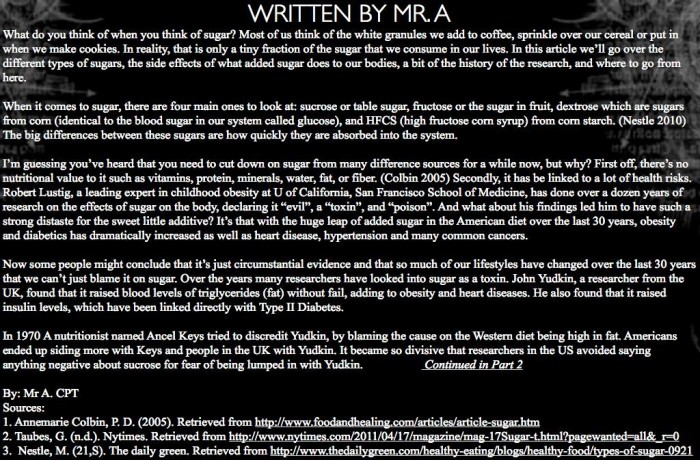What do you think of when you think of sugar? Most of us think the white granules we add to coffee, sprinkle over our cereal or put in when we make cookies. In reality, that is only a tiny fraction of the sugar that we consume in our lives. In this article, we'll go over the different types of sugars, the side effects of what added sugar does to our bodies, a bit of the history of the research, and where to go from here.
When it comes to sugar, there are four main ones to look at: sucrose or table sugar, fructose or the sugar in fruit, dextrose which are sugars from corn (identical to the blood sugar in our system called glucose), and HFCS (high fructose corn syrup) from corn starch. (Nestle 2010) The big differences between these sugars are how quickly they are absorbed into the system.
I'm guessing you've heard that you need to cut down on sugar from many different sources for a while now, but why? First off, there's no nutritional value to it such as vitamins, protein, minerals, water, fat or fiber. (Colbin 2005) Secondly, it has been linked to a lot of health risks. Robert Lustig, a leading expert in childhood obesity at U of California, San Francisco School of Medicine, has done over a dozen years of research on the effects of sugar on the body, declaring it "evil", a "toxin", and "poison". And what about his findings led him to have such a strong distaste for the sweet little additive? It's that with the huge leap of added sugar in the American diet over the last 30 years, obesity and diabetes has dramatically increased as well as heart disease, hypertension and many common cancers.
Now some people might conclude that it's just circumstantial evidence and that so much of our lifestyles have changed over the last 30 years that we can't just blame it on sugar. Over the years, many researchers have looked into sugar as a toxin. John Yudkin, a researcher from teh UK, found that it raised blood levels of triglycerides (fat) without fail, adding to obesity and heart diseases. He also found that it raised insulin levels, which have been linked directly with Type II Diabetes.
In 1970, a nutritionist named Ancel Keys tried to discredit Yudkin, by blaming the cause on the Western diet being high in fat. Americans ended up siding more with Keys and people in the UK with Yudkin. It became so divisive that researchers in the US avoided saying anything negative about sucrose for fear of being lumped in with Yudkin. (Continued in Part 2)
Sources:
- Annemarie Colbin, P.D. (2005). Retrieved from http://www.foodandhealing.com/articles/article-sugar.htm
- Taubes, G. (n.d.). Nytimes. Retrieved from http://www.nytimes.com/2011/04/17/magazine/mag-17Sugar-t.html?pagewanted=all&_r=0
- Nestle, M. (21,S). The daily green. Retrieved from http://www.thedailygreen.com/healthy-eating-blogs/healthy-food/types-of-sugar-0921


